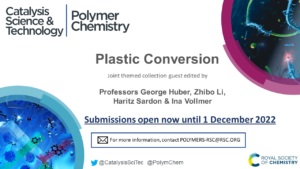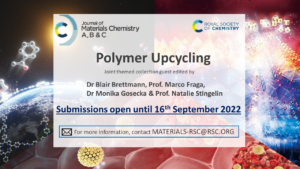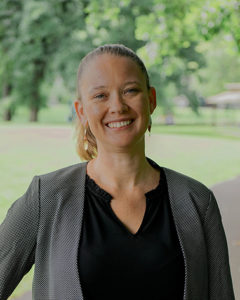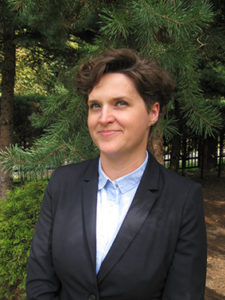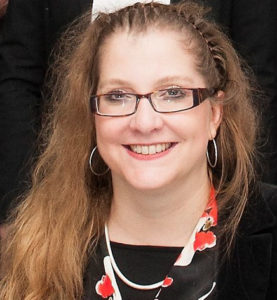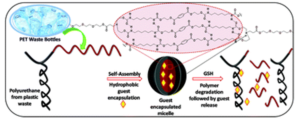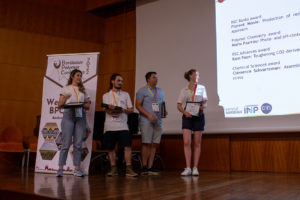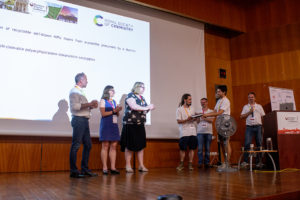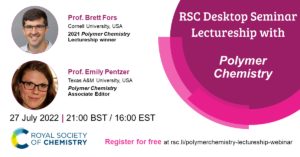The Royal Society of Chemistry has announced an open call to submit your plastics research to our themed collections on ‘Plastic Conversion’ and ‘Polymer Upcycling’.
The Royal Society of Chemistry is committed to sustainable plastics research and has published a policy statement regarding plastic waste. With increasing impact of plastic waste on the environment, it is necessary to research ways in which we can have a sustainable future for plastics.
Plastics research is interdisciplinary and involves a wide range of chemical scientists. As such, we invite you to contribute to our cross-journal themed collections by submitting your work to Journal of Materials Chemistry A, B, C, Polymer Chemistry or Catalysis Science & Technology.
Plastic Conversion
Joint themed collection between Polymer Chemistry and Catalysis Science & Technology
Catalysts have been the main driver for the design of ever new polymers with highly diverse and specialized properties. In this themed issue, we aim to highlight research that makes use of catalysis to optimize the reverse. How can we get the most value out of plastic waste? In this quest, we especially welcome manuscripts that address the challenges unique to plastics. These include but are not limited to additive impurities; mixed polymer streams; how to contact the very viscous, high molecular weight polymer with the (micro-)porous catalyst or a cleavage agent and more broadly catalytic conversion of sustainable polymeric materials for a circular plastic economy. Unconventional approaches via photo-, electro- or mechano-catalytic approaches and combinations thereof are also very welcome. We highly encourage to place the work in the context of performance metrics of green chemistry.
Submissions should fit the scope of either Polymer Chemistry or Catalysis Science & Technology. We would suggest that articles focused on synthetic and polymer chemistry aspects would be best suited to Polymer Chemistry, whereas articles focused on catalytic and/or related methodological advances would be appropriate for Catalysis Science & Technology. The collaborative joint special issue recognizes that management of plastic wastes relies on research conducted at the intersection of polymer chemistry and catalysis. You may submit to whichever journal you feel is most relevant to your current research. Please note that your article may be offered a transfer to the alternate journal if deemed more appropriate by the handling editor.
For more information, visit our open calls page
Guest Edited by:
Professor Ina Vollmer (Utrecht University, Netherlands), Professor George Huber (University of Wisconsin-Madison, USA), Professor Haritz Sardon (POLYMAT, University of the Basque Country UPV/EHU, Spain) and Professor Zhibo Li (Qingdao University of Science and Technology, China)
Submit your work to Polymer Chemistry or Catalysis Science & Technology now!
Polymer Upcycling
Joint themed collection between Journal of Materials Chemistry A, B and C
In 2015 alone, the global waste generated by plastic packaging applications was 82.7 metric tons (Mt). Currently, waste management practices for the end-of-life plastics exploit landfilling, industrial energy recovery from municipal solid waste incineration, pyrolysis and recycling. Due to the ubiquity and necessity of plastics in our daily life, the elimination or reduction of plastics is not foreseeable in the near future and fundamentally new science is needed to describe and understand the polymers, interfaces, decomposition and upcycling of plastics. This Themed Collection aims to explore the latest developments in materials characterization, polymer design and synthesis, physical chemistry and molecular understanding of plastic decomposition and transformation that contribute to a broad knowledge base for upcycling waste plastics.
Submissions should fit within the scope of Journal of Materials Chemistry A, Journal of Materials Chemistry B or Journal of Materials Chemistry C. We welcome high quality studies across all fields of materials chemistry in the form of full Papers, Communications and Review-type articles (Reviews, Highlights or Perspectives) and we invite authors to select the journal that best suits their submission.
For more information, visit our open calls page
Guest Edited by:
Blair Brettmann (Georgia Institute of Technology), Marco Fraga (Instituto Nacional De Technologia Brasil), Monika Gosecka (Polish Academy of Sciences) and Natalie Stingelin (Georgia Institute of Technology)
Submit your work to Journal of Materials Chemistry A, Journal of Materials Chemistry B or Journal of Materials Chemistry C now!
If you would like to contribute to either of these themed collections, you can submit your article directly through the journal’s online submission service. Please add a “note to the editor” in the submission form when uploading your files to say that this is a contribution to the respective themed collection. The Editorial Office reserves the right to check suitability of submissions in relation to the scope of the collection, and inclusion of accepted articles in the final themed collection is not guaranteed.
If you would like more information about the ‘Polymer Upcycling’ themed collection, please email Materials-rsc@rsc.org. For more information about the ‘Plastic Conversion’ themed collection, please email Polymers-rsc@rsc.org.
We look forward to receiving your submissions and showcasing this important research in our collections.


